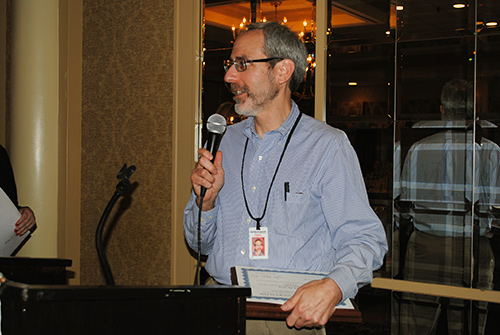Investigative Reporter Offers Glimpse Into Journalism Realm

From soldiers’ mental health to gun laws, reporter Matthew Kauffman has covered it all.
March 27, 2019
Matthew Kauffman has covered the uncovered stories for over 30 years as an investigative reporter at the Hartford Courant.
During his time, Kauffman became a finalist for the Pulitzer Prize in investigative reporting for a co-authored piece on the mental health of military troops sent to war.
His writing journey began in high school with a simple opinion piece. Since then, the “journalism bug” has continued to follow him. Kauffman’s career in investigative work started when he was a writer for The Miscellany News at Vassar College. Since then, Kauffman has been uncovering stories and informing people of the truth.
“Journalism seemed like a good way to not take sides, to be an advocate and present information to people, to sort of enlighten them and let them decide how they feel about something,” Kauffman stated.
As an advocate of information, Kauffman has found it is important to provide people with information from experts, those with strong opinions and, most importantly, the people it is impacting.
“Even after all this time, I am still amazed how many times people are willing to talk to me,” Kauffman shared “Average people like their voice being recognized. People going through something difficult [think] it can be almost cathartic because someone is interested in their story.”
Kauffman experienced just that when he co-authored a piece on mental health in the military, in which he focused on how the increased level of troop suicides impacted the families going through loss.
The story highlighted how military families felt about the loss and the lack of mental care troops receive overseas.
By showing an angle of the story that was not typically covered, Kauffman shined a light on a community of people that they themselves didn’t even know existed. From his investigation, Kauffman was able to create change in the way military provides mental health assistance. In a way, his reporting at the Hartford Courant reporting has helped “saved lives on the battlefield.”
Throughout his career, Kauffman highlighted the importance of keeping the information unbiased and fair for the people, irregardless of his personal views.
After the 2016 presidential election, Kauffman found many people were focused on immigration laws, LGBTQ rights, race issues and Affordable Care Act, many of which having no direct impact on him.
Despite the lack of direct influence, Kauffman found that it is important to give light such matters in a fair, unbiased manner.
“As a [Jewish], middle-aged, white, employed, straight male with health insurance, I look at the landscape [of society],” Kauffman said. “It’s easy for me to say that ‘our job is to present the information, we don’t take sides,’ at a time where there are people who are legitimately concerned about their roles in society.”
“I don’t know how I would feel if I didn’t have all those check marks of privilege but I hope it’s still important there is a straight line of journalism that is just and goes straight down the middle,” Kauffman continued.
At the end of the day, Kauffman sees his journalism career as a success and continues to build upon it, as well as helps raise aspiring journalists by teaching at Central Connecticut.
“I have a brother in Silicon Valley and a brother on Wall Street, their houses are definitely way nicer than mine. But who’s got better stories for their grandkids?” Kauffman stated.






